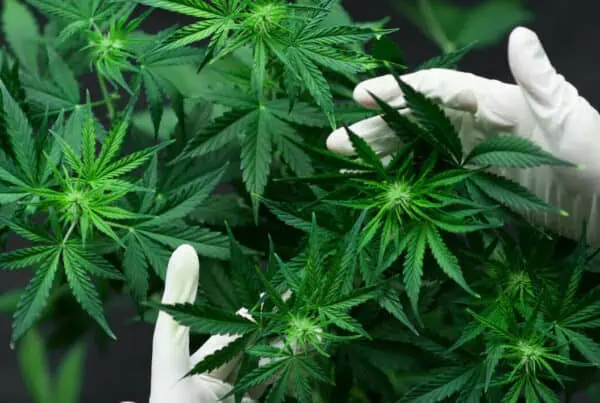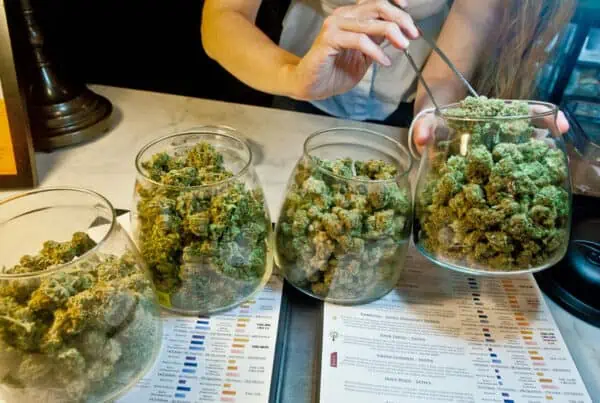TABLE OF CONTENTS

Get hired as a budtender with free dispensary certification online. You see some ads for that sometimes.
Unfortunately free is usually a sign something has no value. And that is the case with budtender training online for free claims.
Free Dispensary Certification Online
For actual dispensary certification courses online there are programs that are not free, and are still affordable, and provide actual value for those looking to work in a dispensary.
Cannabis Training University is the leader in cannabis education and has trained over 60,000 students for cannabis jobs and dispensary careers.
Budtender Requirements and Duties
A budtender is a specialist in the selling of cannabis goods as well as in educating customers and responding to their inquiries. They advise customers on the many cannabis strains that are available and act as educated authorities in the marijuana market.
They frequently work in a dispensary, although they may also work for delivery services, producers, or other cannabis-related companies. Budtenders need to be aware of marijuana's legal recreational uses as well as its medical applications.
To succeed in this role, prospective Budtenders should have excellent communication skills, in-depth knowledge of various marijuana strains, cannabis-derived edible goods, and tinctures/topicals infused with therapeutic cannabinoids.
They also need to be knowledgeable about the cultivation and processing of these items, from seed to store shelves. It is essential to have a passion for providing excellent customer service as well as an understanding that every customer has different demands and wants.
The main responsibilities of a budtender are to provide excellent customer service by answering questions about various marijuana strains and other marijuana products, recommending particular varieties based on a customer's needs, explaining the effects and benefits of various marijuana varieties, packaging up orders for customers, creating labels for packages, updating inventory data, properly discarding of expired product, and reporting any problems with customers or vendors to management.
Want a budtender certification? Looking for a way to work in a dispensary?
How To Get a Budtender Job In a Dispensary
Potential Budtenders must not only be knowledgeable about marijuana, but also have competency with computers, including data entry, and a general understanding of POS systems (Point Of Sale).
Other requirements could be knowing the laws governing safe handling procedures for edibles/medical products made from cannabis or being older than 21 (depending on local legislation), as alcohol is occasionally sold alongside marijuana.
Depending on the job, further training can be necessary, such as passing a background investigation on potential employees or acquiring a specialized license from a state agency like the Department of Health and Human Services (DHHS).
Last but not least, as many people still refer to marijuana when buying it by its street names, being conversant with slang terms for it might help guarantee that clients get what they need.
Dispensary Management Duties and Career Outlook
An increasingly common way to buy cannabis products is via dispensaries. The administration of a dispensary necessitates a thorough knowledge of the rules and legislation that regulate the sector as well as a comprehension of the daily tasks necessary for efficient operations.
We will talk about dispensary ownership, legal requirements, financial factors, and daily operations in this paper.
Dispensary Ownership
A dispensary can be purchased in a number of different ways. Depending on local rules and regulations, it can entail setting up an individual proprietorship, a business partnership, or a limited liability corporation (LLC).
It's critical for prospective owners to be aware that certain localities may have limits on who is permitted to own dispensaries. In some states, owners must also have resided there for at least a year before they may apply for a license.
It's also crucial to remember that most states demand that all parties with a stake in the company entity be disclosed at the time of application. Want to open a dispensary?
Dispensary License Conditions
State-to-state variations in the licensing procedure may occur, but in general it entails filling out a number of forms, making various license-related payments, and receiving any necessary permissions, such as those for growing or testing facilities.
Potential owners should conduct their due diligence before applying so they are aware of the applications that must be submitted and any additional conditions, such as background checks for all individuals involved.
Additionally, many states mandate security precautions including video surveillance systems and secured product storage.
Dispensary Expense Costs
The start-up costs of opening a dispensary include rent or purchase of retail space, insurance premiums related to product liability issues, security installation costs such as cameras and locksmith services, inventory costs such as supplies needed for product packaging, as well as employee wages that must adhere to minimum wage requirements in each state where you operate.
When planning start-up costs of a dispensary, advertising costs should also be included because they are likely to change based on when promotions are scheduled throughout the year.
Dispensary Day-to-Day Activities
The use of billboards or print media advertisements to advertise a dispensary's business entity and product offerings within their area of operation is crucial for maintaining compliance with local regulations regarding product labeling requirements (which can vary depending on location).
This is especially true if the advertisements use slang terms related to cannabis.
In order to ensure compliance with all applicable laws regarding taxation matters specific to either medical marijuana use or recreational use depending on where your dispensary operates from, dispensaries must also keep accurate records pertaining to outbound sales information that must match up correctly when audited by local authorities (as this can also vary widely between different locations).
Why You Should Earn A Budtender Certificate
Are you interested in landing a fun and rewarding career in a medical or recreational cannabis dispensary?
Budtending jobs are some of the most popular entry-level positions in the industry, with many opportunities for career growth in retail and beyond.
A Budtender certificate from a trusted cannabis training institute gives you the knowledge you need to provide customers with a great experience.
The Budtender Certificate, part of the online Master of Cannabis Certification Program at Cannabis Training University, helps you land your dream job as a budtender.
1. Learn the Basics
Even if you’re new to cannabis and want to use your customer service, retail, and hospitality skills, you can enroll in CTU’s all-inclusive training program and learn about the plant and the industry from the ground up. Learn about cannabis history, laws, science, and more.
- What are the different types of cannabis products, and how are they used?
- How does cannabis interact in the body?
- What medical conditions and symptoms can cannabis treat?
- What are the medical cannabis laws in each state?
- Are there any side effects or medication interactions?
- How do you prevent “greening out”?
Our complete program gives you a solid educational foundation and provides instruction on more advanced subjects later on to make you a cannabis expert.
2. Understand How to Use Cannabis as Medicine
In some states, only medical cannabis use is allowed, not recreational. Budtenders working at medical cannabis dispensaries provide patients guidance on the best method of consumption and products based on their therapeutic needs.
CTU’s Medical Marijuana Certificate, included in the Master of Cannabis Program, teaches you everything about safe medicinal use. You’ll learn about different strains, how they can be used to treat various diseases, safe cannabis administration, titration, dosage, and more.
Since cannabis is a relatively new industry, patients may have many questions about its use. Obtaining certification from CTU provides you with the most up-to-date information on cannabis clinical research so that you can steer patients in the right direction.
3. Learn How to Grow Cannabis
In states where it’s legal to grow cannabis at home, dispensaries may sell cannabis seeds and clones. Our Indoor Marijuana and Outdoor Cannabis Certificate, included in the all-inclusive program, teaches you the essentials of setting up a garden and choosing the right growing medium, nutrients, grow lights, ventilation, and more.
Understanding the intricacies of caring for a plant from when it’s just a seedling to its mature stage can train you to help customers with their questions about cannabis cultivation. In addition, it can start your journey into the world of cultivation if you’re ever interested in making a lateral shift to a grow facility.
4. Make Your Own Edibles and Topicals
Our Cannabis Cooking Certificate gives you informative lessons and videos on making cannabis-infused butter and oil, properly dosing edibles, and working in a commercial cannabis kitchen. Knowing how to grow cannabis and make edibles and topicals at home can be a rewarding experience that saves you money.
5. Learn About Cannabis Extraction
Cannabis extraction refers to stripping the plant’s cannabinoid-rich resin to create a wide range of products, including extracts, vape cartridges, infused pre-rolls, edibles, tinctures, and topicals.
Our Cannabis Extraction Certificate, part of the Master of Cannabis program, can show you how to work in an extraction facility or start your own. CTU’s complete program gives you a deep dive into every industry sector to find a perfect job fit.
6. Create a Stellar Cannabis Resume and Cover Letter
Our Master of Cannabis Certification Program provides you with instructions on creating an excellent budtender resume and cover letter, including templates you can fill out and print at home. The Budtender Certificate provides you with detailed, step-by-step instructions to create a resume and cover letter that showcases your experience, skills, and education.
7. Learn About Work Permit Requirements
CTU’s online cannabis school provides you with the latest work requirements in all U.S. and Canadian states, provinces, and territories. Learn about minimum age, training, background check, application, and fee requirements to help you land your first gig.
8. Gain Industry Experience
Even if you don’t have any direct industry experience, CTU’s Master of Cannabis Certification can show you how you can volunteer in advocacy groups. In addition, we guide you on using your transferable skills to find a related job in cannabis.
9. Find Out Where to Look for Budtender Jobs
Cannabis is the fastest-growing job sector in the country. In this competitive atmosphere, you need to know where to look for budtender jobs. A Budtender certificate shows you job boards, recruitment agencies, networking strategies, and other ways to find a budtending job.
10. Get an Industry-Renowned Budtender Certificate
Completing all courses and certifications included in the Master of Cannabis Certification Program and passing the final exam gives you a downloadable and printable certification. Industry credentials from CTU are widely recognized by cannabis business owners.
Certification from CTU helps you stand out among other job applicants. Credentials can look great on your resume and cover letter. Although certification is not required to get a budtender job, it can be the competitive advantage you need.
Or if you just need a Budtending Certificate, enroll directly in our Budtender Certification Online Program.
Start Your Cannabis Journey Today!
For a small investment, a budtender certificate can prepare you to start your cannabis career on the right foot. Enrollment at CTU gives you 12 weeks of access to our entire online training program, hundreds of hours of instruction, videos, and ebooks, and plenty of downloadable resources
Dispensary Training Online
Looking for dispensary training online? Want to learn how to open a dispensary from an accredited cannabis college? Check out the CTU dispensary management certification program and learn how to open a dispensary today!
Looking for free dispensary training online? Get your free dispensary e-book today!
How much does it cost to open a dispensary in Florida?
To open a medical marijuana dispensary, applicants must be registered with the Department of Health’s Medical Marijuana Use Registry. In addition, they must submit an application to the Florida Division of Medical Quality Assurance (MQA). The cost for this application is $6250, which is non-refundable regardless of whether or not the application is approved. Furthermore, applicants must also provide proof of financial responsibility for up to $5 million in damages to cover potential liabilities.
How much does it cost to open a dispensary in Colorado?
Opening a dispensary in the state of Colorado requires careful planning and a significant financial investment. Depending on location, type of business, and the complexity of operations, the cost to open a dispensary in Colorado can range from $150,000 to more than $1 million.
When opening a dispensary in Colorado, there are certain compliance costs that must be taken into consideration.
First and foremost is obtaining an Occupational License which requires an application fee ranging from $2,500 to $10,000. Additionally, an applicant must have met all local requirements such as zoning ordinances and permits before applying for the license. Other licensing fees include:
• Cultivation License fee – $6,000
• Dispensary License fee – $2,000
• Retail Storefront Licensing Fee –$3,750
• Manufacturing Facility Licensing Fee – $15,000
• Processor/Manufacturer Licensing Fee -$20,000
• Testing Laboratory Licensing Fee –$5,250
• Transporter Vehicle Permit Fee –$750
• MIP (Marijuana Infused Product) Manufacturer Licensing Fee –$30,000
How much does it cost to open a dispensary in Missouri?
Opening a dispensary in Missouri can be an expensive endeavor. The application fee for a dispensary license is $6,000, and that amount must be paid when the application is filed with the Department of Health and Senior Services. Additionally, applicants must pay a non-refundable annual licensing fee of $10,000 each year after their initial application is approved. Every dispensary must also have a qualified patient or caregiver present at all times during operating hours and maintain a minimum capitalization of $100,000 in its operating account. Furthermore, dispensaries are limited to two physical locations for any one entity, meaning that additional fees may apply if more than one location is necessary.
How much does it cost to open a dispensary in Illinois?
Opening a dispensary in Illinois in 2023 requires significant financial investments. The cost of obtaining the necessary licenses and permits can range anywhere between $50,000 to $150,000 depending on the location. Additionally, applicants must provide a non-refundable fee of $400 which must be submitted with the application form.
The total cost of opening a dispensary also includes expenses related to setting up the facility, such as building and renovation costs, security systems, IT infrastructure and supplies. Depending on the size and type of dispensary that is being established, these costs can quickly add up and run into millions of dollars. In addition to these expenses, an aspiring dispensary owner must also factor in the cost of taxes related to their business.
In order for an individual or business entity to open a cannabis dispensary in Illinois by 2023, they must first be approved by the state’s Department of Financial and Professional Regulation (IDFPR). A prospective applicant must meet certain criteria as outlined by IDFPR including having at least two years of experience managing or owning a legal cannabis business elsewhere before applying for an Illinois license. To qualify for any type of cannabis licensing in Illinois, individuals and businesses are required to hold at least $100,000 worth of capital assets in addition to other financial requirements which may change over time.
How much does it cost to open a dispensary in Las Vegas?
Opening a dispensary for cannabis in Las Vegas for 2023 can be quite expensive, depending on the size and scope of your business. Getting started requires high upfront costs that include zoning regulations, licensing fees, security deposits, and more. Generally speaking, you’ll need at least $250,000 to cover setup costs. It’s also important to consider operational costs such as rent or property purchase, inventory and staff expenses.
For an example of what to expect for the startup cost of a dispensary in Las Vegas in 2023, consider this: You must first submit an application to the Nevada Department of Taxation (NDT). The fee is $5,000 and can take up to 90 days or longer to process. You will also need to pay a license fee which is currently set at $30,000 per year with additional renewal fees every other year thereafter. Security deposits range between $10k-$50k depending on what type of facility you plan on operating. In addition, there could be other costs associated with renting or purchasing real estate since many commercial properties are not zoned for cannabis use unless they have obtained special permits.
Moreover, all dispensaries must secure an off-site storage location where cannabis products can be held until dispensed by the store owner or their employees. This storage facility must meet strict safety standards and is subject to inspection by NDT personnel prior to opening. The cost for a storage unit begins at around $2k per month but could increase if you need additional space for larger inventory items such as edibles or concentrates. Lastly, it’s important to note that all employees working on-site must undergo extensive background checks that require both state and federal level clearance in order to be legally employed within Nevada's marijuana industry.
“
There are over 300,000 jobs in the cannabis industry. CTU trained me for one of them!

Makes $24.50 @ THC +
All told, opening a dispensary in Las Vegas in 2023 could easily reach upwards of half a million dollars before factoring in operational costs like rent/property purchase and employee expenses; so it’s really wise to plan ahead and budget accordingly before deciding on what type of business venture you want to pursue when it comes time to open shop!
How much does it cost to open a dispensary in Arizona?
Opening a dispensary in Arizona in 2023 is not a simple task. It requires careful planning and considerable financial resources. The cost of opening a dispensary will depend on several factors, including the size of the dispensary, its location, the type of cannabis products it will offer, and any additional services or amenities it may provide.
In general, opening a dispensary in Arizona could cost anywhere from $20,000 to $150,000 or more depending on these factors. This cost includes the initial licensing fees, which can range from around $2,500 to over $15,000. Additionally, it includes expenses such as rent payments, insurance premiums, utilities and other setup costs.
How much does it cost to open a dispensary in New Mexico?
To open a dispensary in New Mexico all applications must include evidence that the applicant holds at least $500,000 in assets used for business operations, and has adequate capital liquidity on hand to cover operating costs. Applicants must also have sufficient funds to maintain ongoing operations for at least 18 months from the date their dispensary is opened.
The fees charged by the Department of Health Medical Cannabis Program (DOHMCP) vary depending on how much cannabis product is being sold by each dispensary. For example, dispensaries must pay $2,500 per month if they are allowed to possess up to 500 pounds of cannabis products. Dispensaries that are allowed to possess up to 1,000 pounds must pay $5,000 per month. Dispensaries with more than 1,000 pounds must pay $7,500 per month in fees.
How much does it cost to open a dispensary in New York?
To open a dispensary in New York it is estimated that the total costs, including license fees, facility build-outs, security systems and more, can range from $400,000 to over $1 million dollars. This does not include the cost of purchasing licenses for each location, which could cost tens or hundreds of thousands of dollars more. Additionally, there are ongoing costs associated with running a dispensary such as employee salaries and benefits, rent and taxes, insurance premiums and advertising expenses.
How much does it cost to open a dispensary in Virginia?
The average cost of opening a dispensary in Virginia can range from around $200,000 to over $300,000 depending on the type of dispensary and its size. This includes the costs for securing a location, design, construction, security systems, licenses and permits, legal fees and more.
How much does it cost to open a dispensary in Nevada?
Opening a dispensary in Nevada in 2023 will come with a significant monetary investment. The exact cost of setting up a dispensary in the Silver State will depend on various factors including the size, scope, and location of operations, as well as the start-up capital available to cover overhead. As such, estimates for the cost of opening a dispensary in Nevada range from $250,000 to more than $1 million depending on these variables.
In addition to this financial investment, prospective business owners must also apply for and be granted a dispensary license from the Nevada Department of Taxation (NDOT). This application process includes paying an initial fee of $5,000 along with additional annual renewal fees which can range anywhere between $30,000 and $60,000 depending on the size and complexity of operations. In addition to these costs, NDOT also requires that potential business owners demonstrate an ability to provide proof of funding for at least three years before approval can be granted.
Furthermore, those interested in opening a dispensary in Nevada must also obtain local approval from their municipality or county government before submitting their application to NDOT. This step typically involves adhering to zoning regulations as well as paying permit fees which vary depending on the location but may range anywhere between $2,500 and $10,000. On top of all this is the necessary infrastructure such as rent/lease payments for physical space or construction costs if building from scratch.

Fred Hernandez
Fred Hernandez is a highly accomplished and versatile writer, boasting an extensive background in the cannabis industry. With an in-depth understanding of various sectors including cultivators, processors, retailers, and brands, Fred's expertise spans across the entire cannabis landscape. As a prominent contributor to CTU, he consistently delivers insightful articles exploring the latest developments, news, and regulations shaping the cannabis industry. Whether it's delving into the intricacies of cannabis products, cannabis strain reviews, or providing comprehensive analyses of cannabis laws, or sharing expert insights on cannabis cultivation techniques, Fred's wealth of knowledge positions him as an invaluable writer and educator for all cannabis-related subjects.












 Jeff was involved in an accident where he endured a traumatic brain injury. He had a week-long stay in ICU where brain surgeons
Jeff was involved in an accident where he endured a traumatic brain injury. He had a week-long stay in ICU where brain surgeons  100% risk free money back guarantee within 48 hours after purchase if student has not completed any of the courses or exams.
100% risk free money back guarantee within 48 hours after purchase if student has not completed any of the courses or exams.